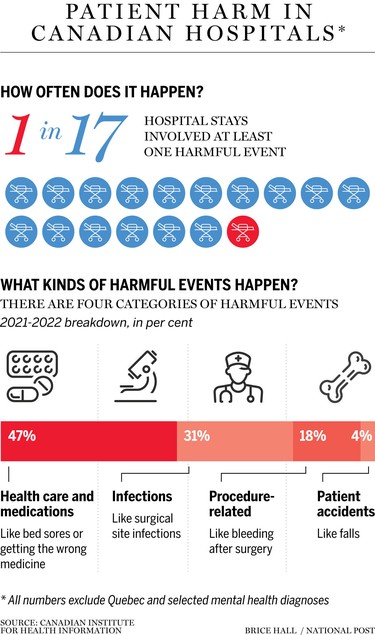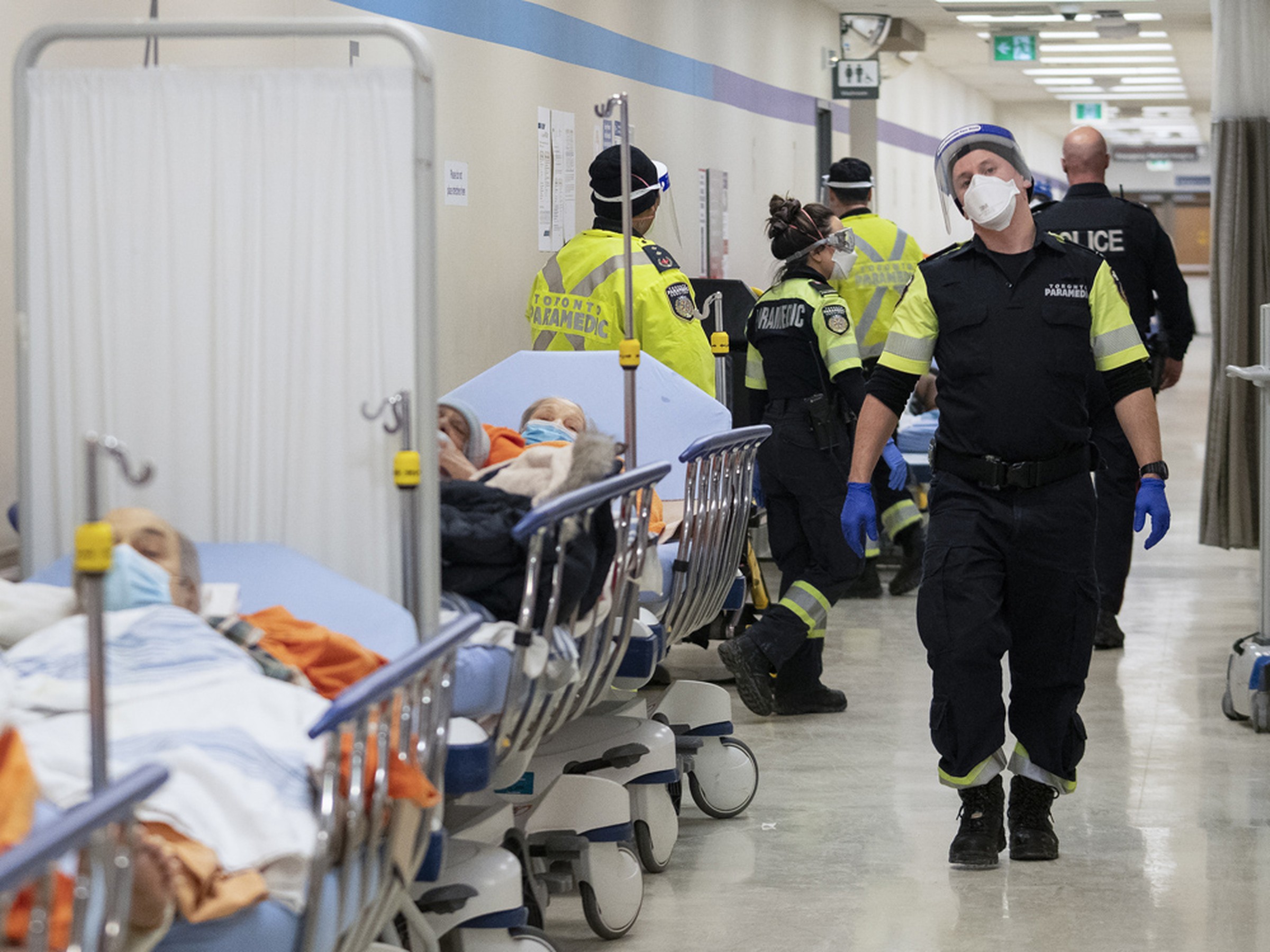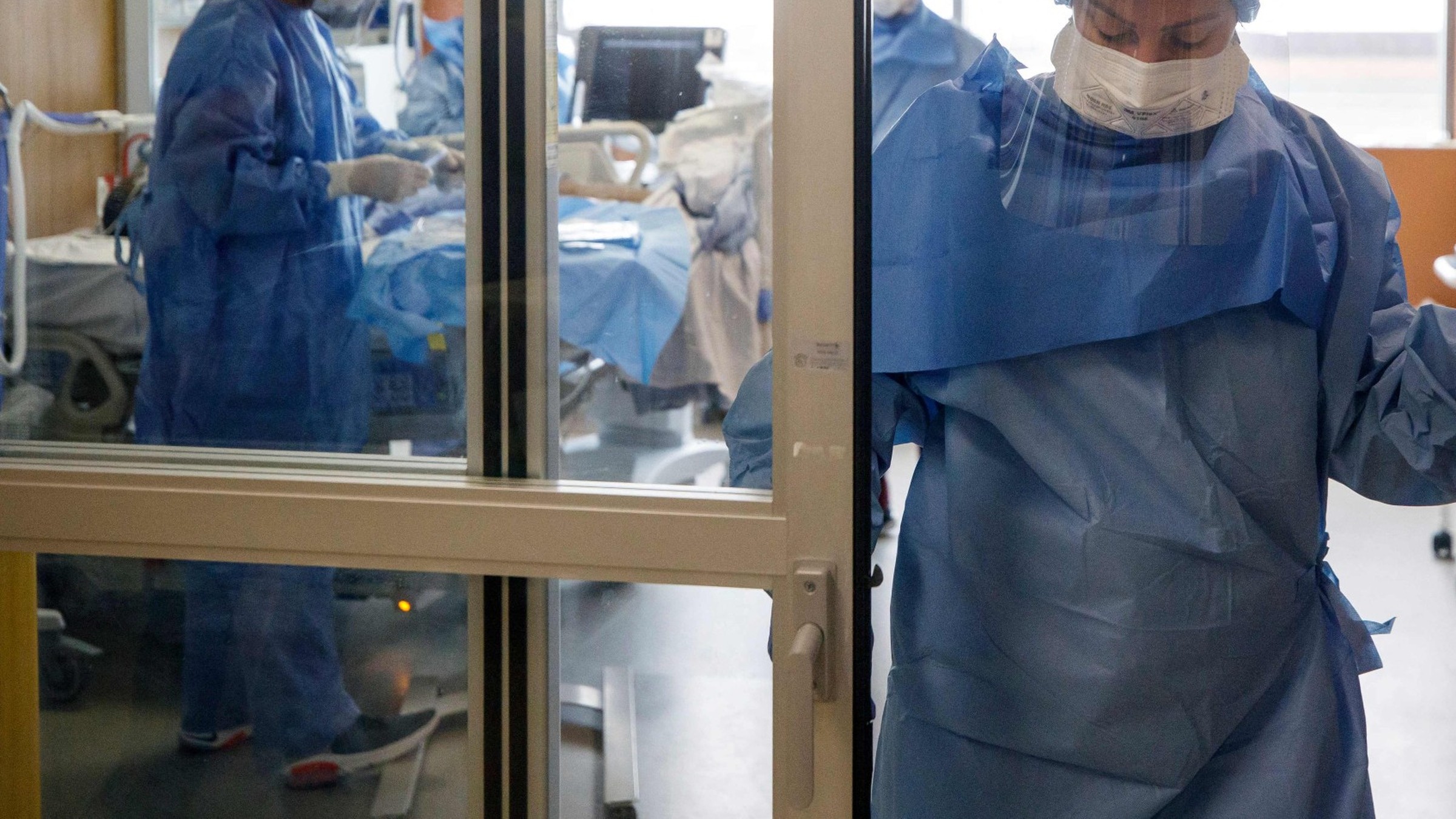Risk to Health and Longevity? A Hospital Environment: Beware
"[Victims are frequently denied] a full and robust explanation.""Very, very seldom will a family leave a hospital after a loved one passes knowing that a medical error has even occurred.""Nothing the nurses or doctors tell [investigators] about what happened that day will ever be made public.""[Not every preventable harm warrants an investigation] but there's a total lack of transparency in the system."Patient safety expert Darrell Horn""[Drs. Ross Baker and Peter Norton referred to a seminal American report published in 1999 that estimated as many as 98,000 Americans died each year as a result of preventable medical errors, calling for sweeping changes to make hospitals safer]. We realized -- and it's hard to believe this -- that people thought, 'well, this is just another flaw in the American system and we [in Canada] don't have to worry about that.""[There's less transparency in Canada], I don't think politicians want to see this.""One of the downsides of a publicly funded, publicly administered system is that there's a political element to it -- politicians feel they'll be beaten up [metaphorically] if there are too many reports about problems in the system.""Nothing provides an incentive for change than to be involved in an event that turns out to have been preventable. It's heart rending. But if people don't feel that they have to report these events, and if they feel they're going to be blamed without a full investigation of all the causes, then you can't make progress on this."Dr. Ross Baker"There are areas where we have made fundamental changes in patient safety that influence our lives.""The risk that I would be infected if I had the same surgery [her grandmother was infected with liver-destroying hepatitis through a blood transfusion before Canada began screening blood] today is fundamentally different.""The folks in hospital now tend to have chronic conditions, tend to be older, and those are risk factors for harm.""If you're on ten medications, the chances that there's going to be a medication mix-up is higher than if you're on one."Jennifer Zelmer, president, Healthcare Excellence Canada"It might all seem terribly unfair to hospitals But to a patient who trusts his life and well-being to a hospital, having a foreign object left in her body after surgery can result in pain, additional treatment and even death.""And doesn't that seem -- what's the word -- unfair?"David Goldhill, author, Catastrophic Care: Why Everything We Think We Know about Health Care is Wrong
 |
Unintentional harm occurs to tens of thousands of people annually in hospitals throughout Canada, though most provinces and territories do not report publicly on "patient safety incidents". Some of which can include life-threatening medication errors, clamps, sponges or other "foreign bodies" erroneously overlooked and left in people following surgery; fatal bed sores caused by not mobilizing or turning patients that eat away at the underlying tissue.
Several decades following a watershed report, it has been estimated that up to 23,750 individuals experience an adverse event and subsequently die in hospitals in Canada every year, from preventable errors, mishaps and "clinical misadventures" as they are called occasionally. Harm to patients hospitalized remains a deadly threat. Primum non nocere: "above all do no harm", an enduring medical ethic that is recognized and respected, but will not necessarily be guaranteed with each and every hospital admission.
 |
| Paramedics transfer patients to the emergency room triage at Toronto’s Humber River Hospital during the COVID-19 pandemic, but must leave them in the hallway due to full capacity. Photo by Nathan Denette/The Canadian Press/ |
One in 17 hospitalizations in 2021/22 amounting to roughly 140,000 hospital stays out of 2.4 million in total hospitalizations, resulted in someone having a harmful event sufficiently significant to require treatment, according to the Canadian Institute for Health Information. Harms in emergency rooms are not catalogued, and neither are "near misses", or harm due to a misdiagnosis, harms in rehabilitation or mental care, or harms that begin in hospital but detected once the person arrives back home.
Laws of legal privilege intended to encourage hospital staff involved in critical incidents to speak freely during investigations without fear what they say will be used against them, provide a formidable blanket of secrecy, according to claims made by patient safety advocates. Hospitals are obliged to disclose an error, but there's confusion around what "facts" should be given to families, or even what constitutes preventable harm. There is no consensus "on the terminology, categorization or tracking" of events across Canada.
Although some people have sued for botched surgeries or for example, the misdiagnosis of a life-altering stroke in a 40-year-old, as vertigo -- the financial or emotional wherewithal to challenge hospital insurers or the Canadian Medical Protective Association, a defence fund for doctors whose membership premiums are subsidized heavily by taxpayers -- remains a deterrent for most people. In defending doctors, CMPA lawyers pursue a "scorched earth policy" when their clients are accused of negligent medical care.
In an effort to reduce errors, protocols such as surgical checklists, a series of steps operated by surgical teams to ensure the right person is on the gurney, the right side of the body to be operated on has been identified, the area has been clipped to prevent bacterial infections in surgical incisions, are followed. Not all adverse events are preventable; slightly over a third are judged preventable in the Baker-Norton report. Even excellent hospitals can have bad outcomes.
Yet critical incidents that should never occur under any circumstance keep happening in every jurisdiction in the country. According to Ontario's auditor general, between 2014 and 2019, ten of 15 "never events" (events so egregious they should have have occurred) occurred at least 214 times at six of the 13 hospitals auditors reviewed. People make mistakes. Serious or deadly mishaps are caused most often by a flawed system rather than the actions of one single person.
 |
Hospital secrets: One in 17 Canadian patients harmed by mistakes that sometimes turn deadly |
Labels: Hospital Accidents, Hospital Protocols, Human Error, Medical Accountability, Patient Safety and Security
0 Comments:
Post a Comment
<< Home